Custom Application Development: Comprehensive Guide
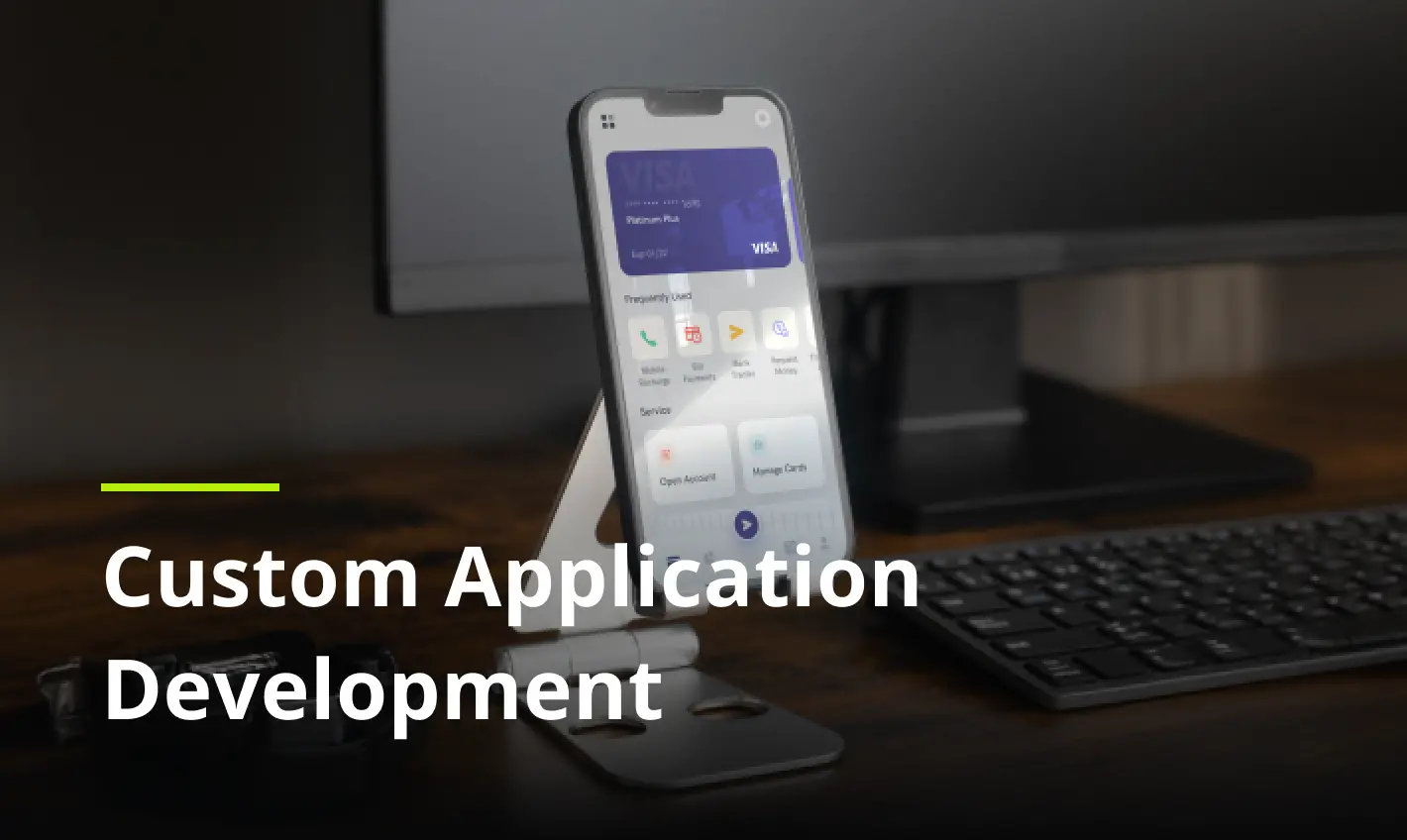
Custom app development is now one of the most prevalent aspects of contemporary management, particularly in the sphere of mobile technologies. Today more and more providers are opting for custom implementations to meet their exact requirements and to provide solutions that are distinct in the marketplace.
Any idea of custom application development implies recognizing its meaning, price, benefits, challenges and trends. This is the process whereby made-to-order apps are created which means they are more flexible and may be scaled easily.
Building custom apps offers a personalized approach that sets businesses apart. By concentrating on particular client wishes and preferences, companies may develop applications that deliver outstanding user experiences and accomplish their goals more successfully. Additionally adapted to the necessities of the business, custom apps increase user satisfaction and loyalty.
What is custom application development?
Application development for a particular organization is close to crafting a suit that will fit a particular customer. Unlike off-the-shelf applications, which might be a one-size-fits-all approach, custom apps are built from scratch to address the precise requirements and workflows of their users.
The working process of such a service begins with careful research of the client’s needs, where the end result must be suitable and harmoniously merged with the client’s activities.
The journey of custom apps development begins with a thorough analysis, much like drawing up a blueprint for a new building. Developers and designers sit together to get an insight into the subtleties of the client’s need, which creates a platform for a solution that may quickly blend with the existing systems and better practice. It lays proper groundwork for the initial phase and makes certain that every single detail is planned as a result of a precise decision.
Akin to a trial run before the grand opening the app has to go through strenuous testing as the development process progresses. Smoothing is required on all activities related to coding, testing and debugging to remove any wrinkle on the application. It involves modifying the app repeatedly based on user feedback to ensure that the application hits the bullseye and thus achieves the intended goals or meets the intended need.
Custom applications come with a host of advantages and in fact are far superior to off-the-shelf applications as they offer flexibility and scalability that ready-made solutions simply can’t match. Instead of having a general form of a tool that is somehow used to fit the various organizations, you get to have one that fits your needs perfectly.
Types of custom mobile application developmen
There are numerous strategies involved in the creation of a custom mobile application although each method is unique and depends on the project requirements that have to be met. Here’s an overview of the main types, enriched with relevant facts and examples.
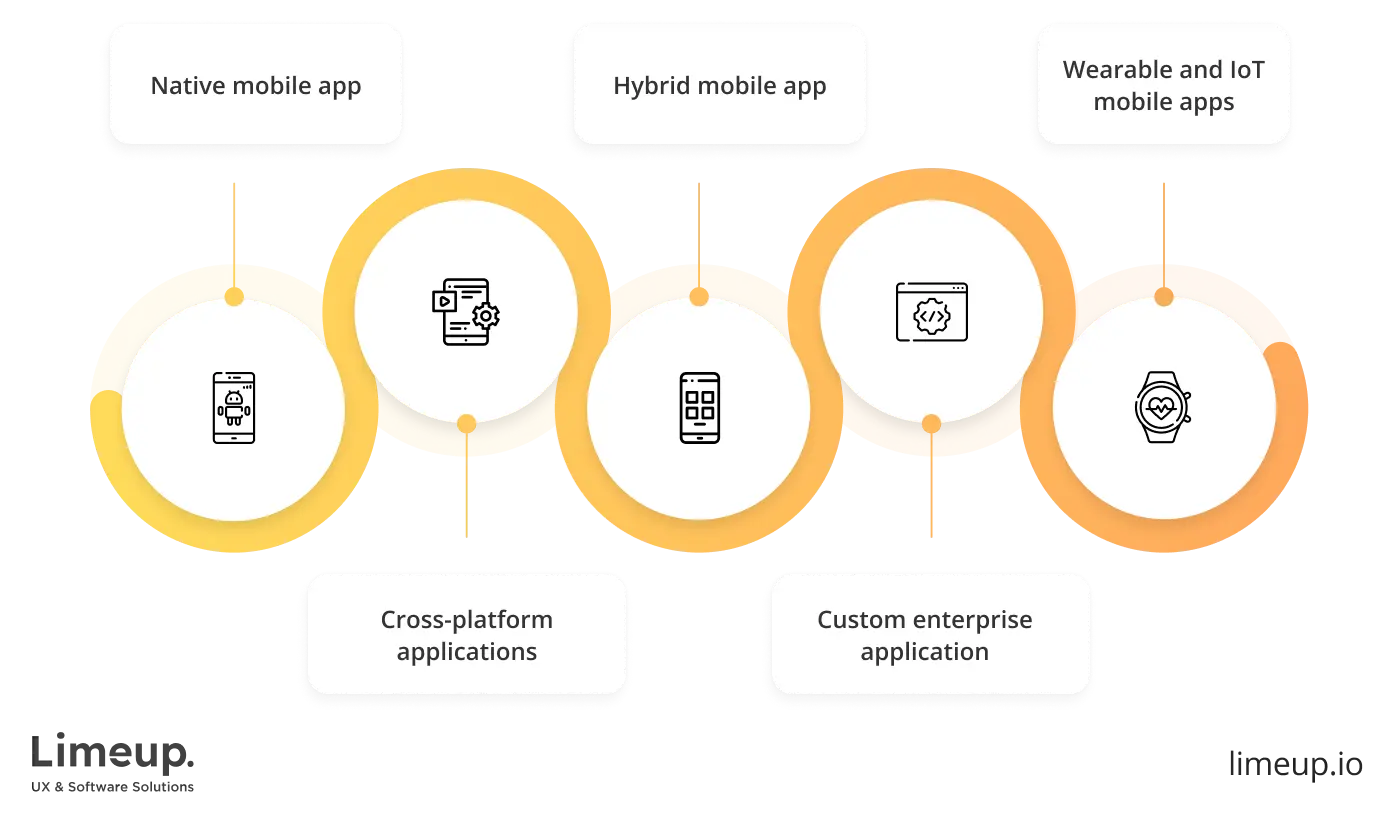
Native mobile app development
Native mobile application development is the standard model of developing custom built applications that are created for a specific platform using the intended API and natural languages of the chosen platform. To develop iOS, developers may use Swift or Objective-C while iOS’s largest competitor, Android, has its own language — Java with an added option of Kotlin language.
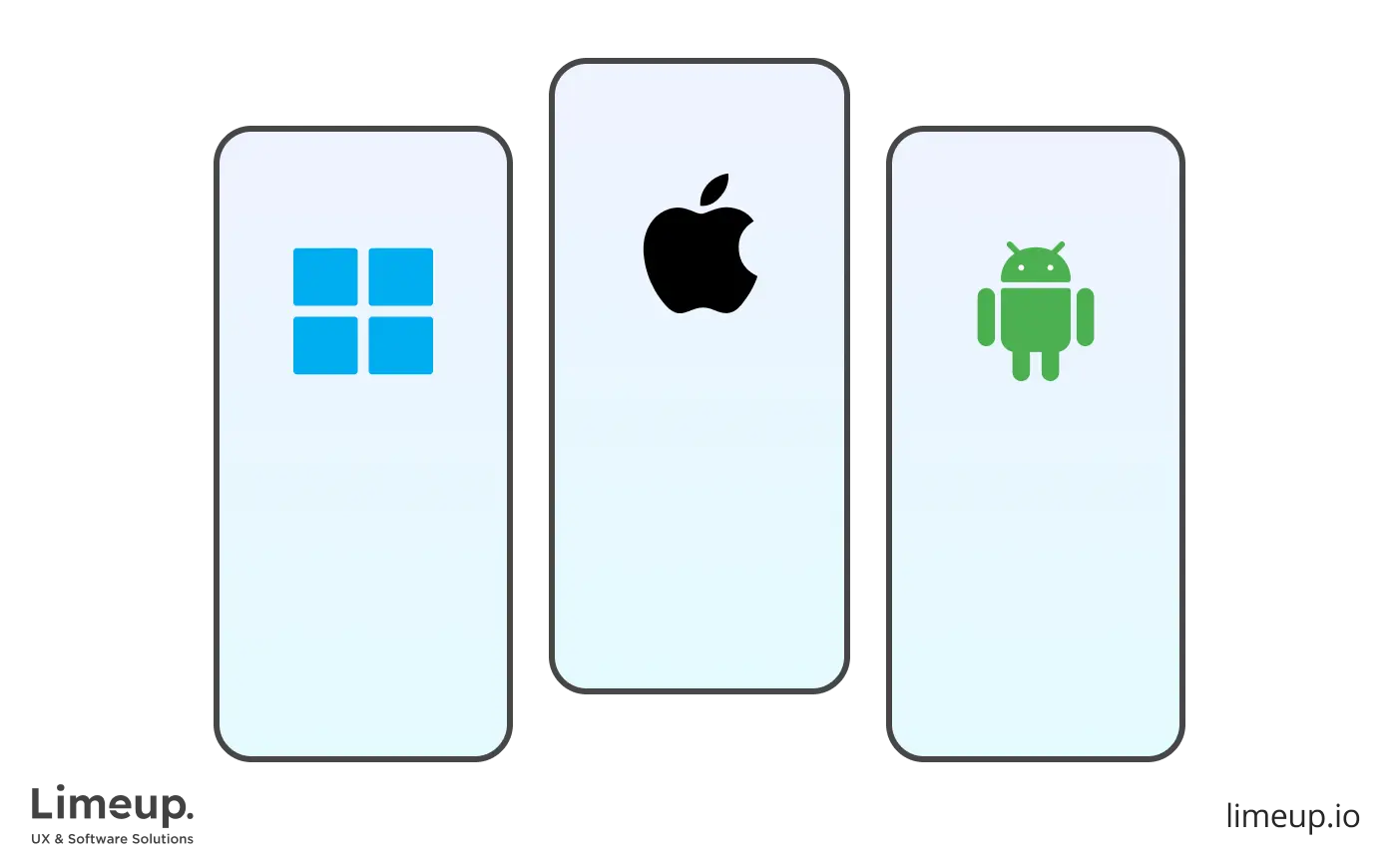
Apple’s App Store and Google Play Store, both established in 2008 and 2009 respectively, are the primary marketplaces for these apps. Native apps are normally known to be the best in performance than the other types of applications and are able to interact closely with the hardware or even the other software within the device.
For example, Instagram, which initially launched on iOS in 2010, was later developed natively for Android to provide an optimized experience across both platforms.
Cross-platform applications creation
Professional custom app developers may create cross-platform applications to run on many operating systems with popular frameworks, which include React Native by Facebook since 2015 and Flutter by Google since 2017. It is able to cut down the time and cost taken in development and make certain that different users use the product in the same manner.
For instance, React Native has been employed in the development of the well-known Airbnb application where timely development and cross-platform compatibility were very important and very well demonstrated across iPhone and Android platforms.
Hybrid mobile app development
Hybrid mobile application development is halfway between developing native and web applications. Custom built application is usually developed using web technologies such as HTML, CSS and JavaScript and are made to run behind a native wrapper that enables them to effortlessly communicate with the characteristics of the devices.
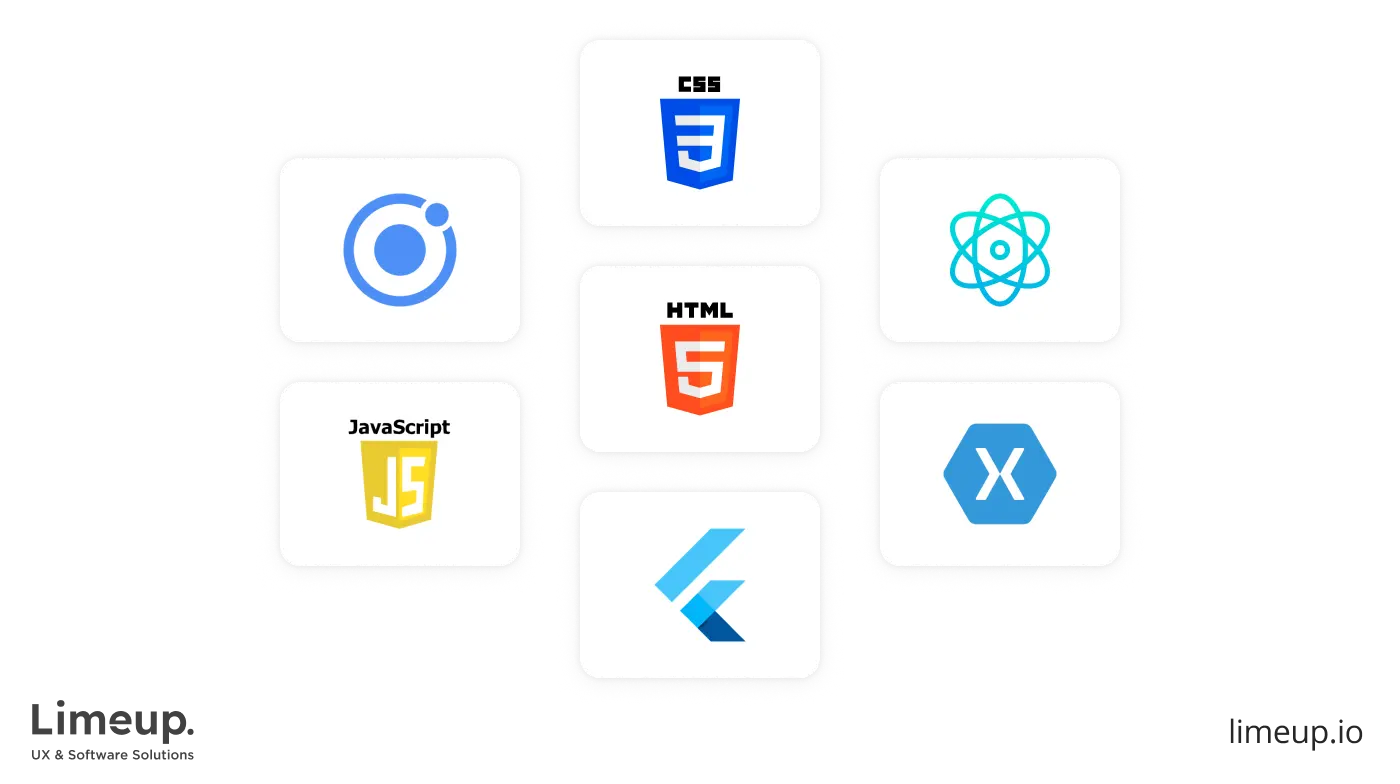
This kind of development is greatly aided by technologies such as the Ionic Framework, which was introduced in 2013, and Apache Cordova, which was originally known as PhoneGap when it debuted in 2009.
Due to their ability to support different platforms with a single codebase, hybrid apps provide an affordable solution. One noteworthy example is the BBC News mobile app, which effectively distributes news material across several platforms by utilizing hybrid technology.
Custom enterprise application development
According to a new report from International Data Corporation (IDC), global spending on enterprise applications is projected to reach $600 billion by 2026. Customized application development for enterprises deals with the construction of applications required by large companies whereby such app is developed to serve the purpose of enhancing the operational efficiency of these organizations.
App development companies in the UK help enterprises solve complicated business processes and operate in concordance with other applications used in a business. For instance, CRM systems are solutions that are exclusive to business needs and are designed with the aim of controlling and organizing customer relationships and sales processes.
Wearable and IoT mobile apps engineering
Wearable and IoT custom application engineering is centered on making applications specifically for use in such devices as smart watches, fitness trackers, smart houses and other connected devices. The advent of the Apple Watch in 2015 and the rise of smart home devices like the Google Nest thermostat have made it possible in this area.
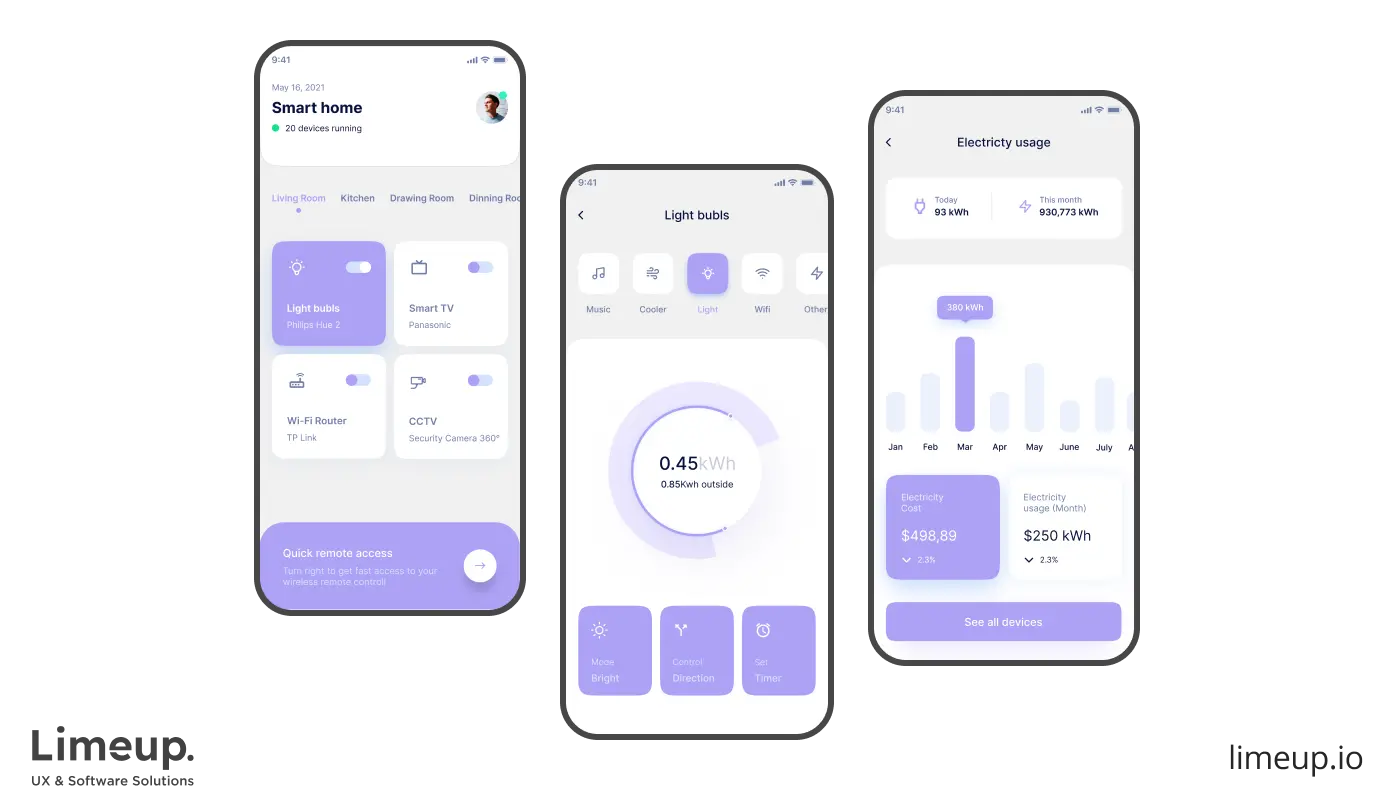
These apps integrate with a wide range of connected devices, offering users actual-time data and enhanced functionality. For example, the Strava app which has gained the reputation as the best fitness app offers tracking and analysis of workouts on wearable devices which shows the role of IoT and wearable technology.
Price of custom app development
The costs of building a custom app may be quite large and depend on different aspects such as the extent of the application, the kind of development process and the level of the engineering team. Factors influencing the cost:
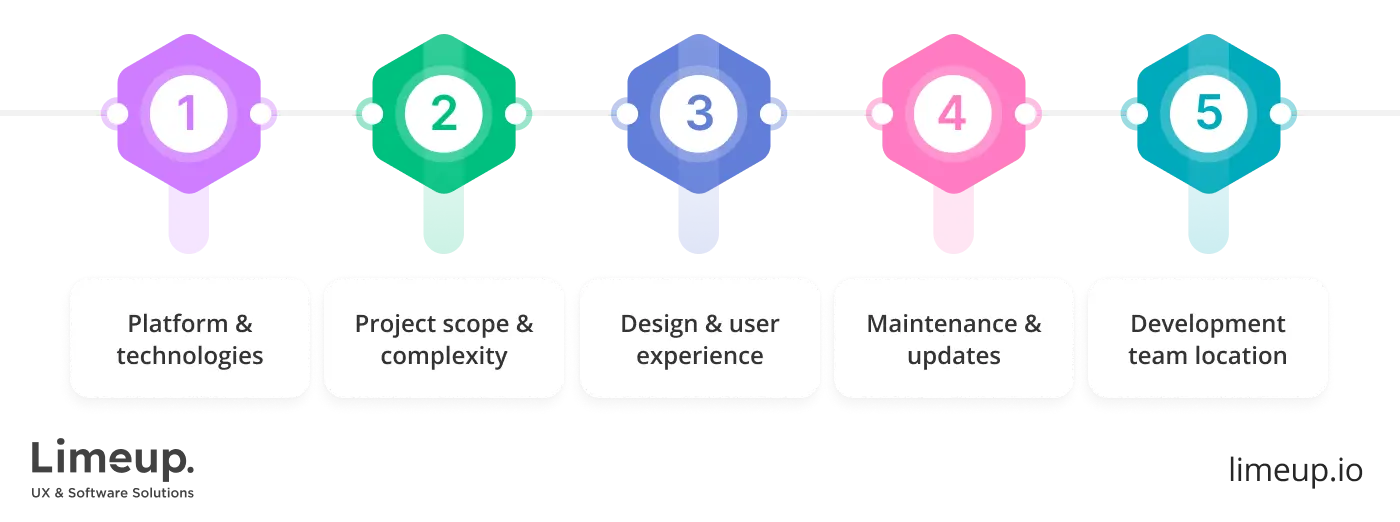
The platform on which the app is being developed, whether iOS or Android or both will always determine the overall pricing. Custom applications development for an assortment of frameworks usually costs more due to the distinct sets of codes and staff required. Cross-platform development, using frameworks like React Native or Flutter, may reduce costs by allowing a single codebase to serve both platforms.
Nonetheless, hybrid apps, while often more cost-effective, might come with trade-offs in performance or user experience.
One important factor influencing the app’s price is its complicated nature — the more complex it is, the more it will cost to develop. More significantly, apps that have enhanced features like real-time data analysis, complex user interface or connection to other services will often take more time as well as expertise to build.
Respectively, a simple app with functions without any specific features is estimated to be developed within $10,000 to $15,000 whereas if you want to get an application with some extra features, the price may go higher than $100,000. A recent survey shows the average cost of creating custom app may vary greatly from as low as $10,000 for simple apps to as high as $150,000 for complex apps.
Designation and the user experience of an app determine the overall cost of development of an app. Such components as high-quality custom made design and complicated UX features can increase costs greatly. As we have already discussed, an app with innovative and user-friendly interface is implemented with more cost since more time is taken to develop and redesign the app.
The initial cost of developing the material is only the first of the costs. Other issues are maintenance, update and support of the system which cannot be ignored. The last component of the jigsaw calls for an additional 5-10% of funding — it covers the price of updating, maintaining and releasing the software to app stores.
Another decisive factor is the proximity of the development team to the business area. The nature of development rates is that they are not constant and may differ from one region to another. North American or Western European developers are known to have a higher rate compared to Eastern Europeans, Asians or Latin Americans. Here is a little table of international rates:
| Country | Price per hour |
| United States of America | $100 – $149 |
| Australia | $100 – $149 |
| United Kingdom | $50 – $99 |
| Canada | $50 – $99 |
| Phillippines | $25 – $49 |
| Ukraine | $25 – $49 |
| Poland | $25 – $49 |
| India | <$25 |
The cost of custom mobile app development this year ranges from $1,000 to $50,000+, according to the App Development Cost survey of more than 100 leading web development businesses. This is a breakdown of the price according to the intricacy of the website.
- Basic apps: Simple layout, social media buttons, lead capture forms, contact form and five to ten pages ($1,000 – $15,000).
- Moderately complex apps: CMS, blog, custom design, 10–20 pages and rudimentary e-commerce features ($15,000 – $30,000).
- Highly complex apps: More than twenty pages, sophisticated design, personalized elements, database connection, advanced e-commerce capabilities, payment gateways, security measures and more.
Benefits of building custom apps
You may be unsure if developing a made-to-order app is worthwhile in your specific situation, even if you are contemplating the idea. Understanding the benefits of unique app development will help you make an informed choice, regardless of your objective — whether it is to increase operations or reach a wider audience.
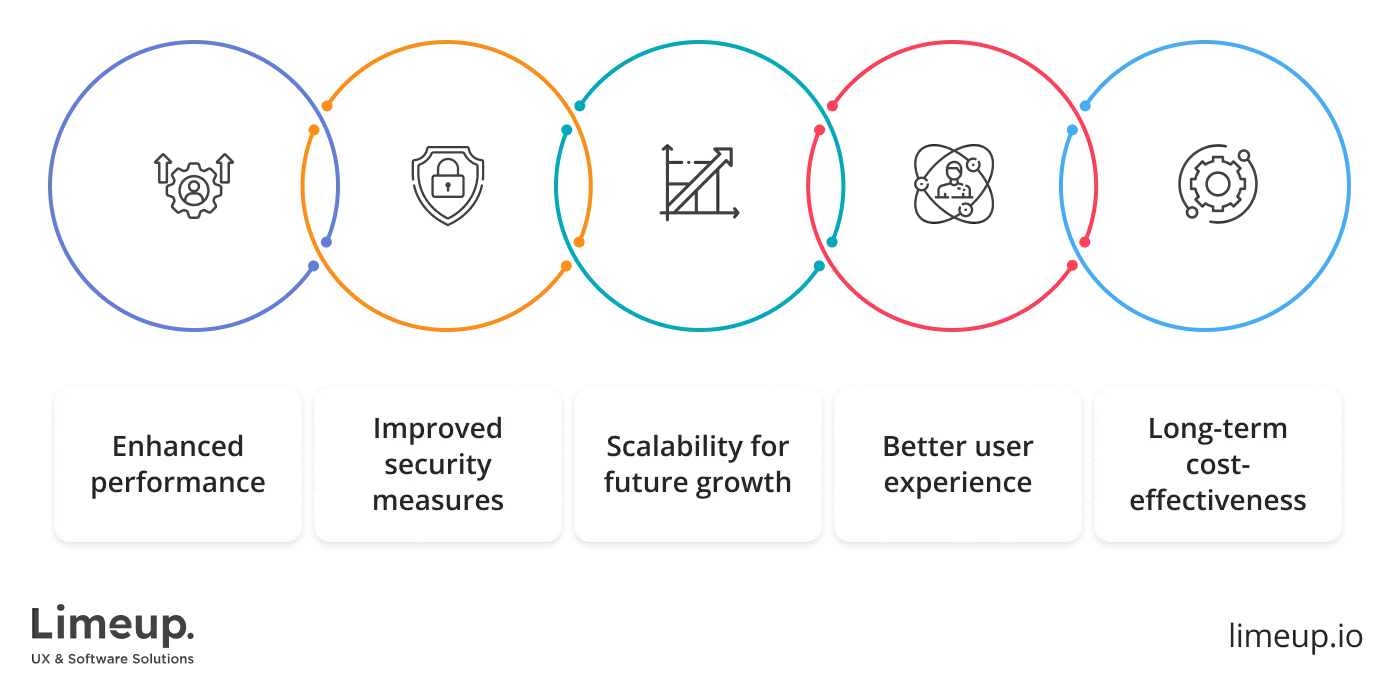
Enhanced performance and efficiency. Custom apps are meant to be integrated and function just like a cog in the business processes of a particular company. Better performance and productivity follow from the app’s likely intentional design with specific tasks and procedures in mind.
As a result, applications made by a custom app development company meet the individual requirements of the business and thereby eliminate the possibility of inefficiencies and duplicate work, therefore benefiting companies by placing them in a better vantage point than their competitors.
Improved security measures. Since data breaches are on the rise, mobile app development services provide additional security features dedicated to a company’s risks. Off-the-shelf solutions are often targeted by cybercriminals because their vulnerabilities are widely known.
However, any sort of customized applications should focus on developing advanced security measures for data so that these sorts of situations could be minimized in which hackers might easily break any kind of regulatory compliance requirements by getting access to the systems.
Scalability for future growth. As businesses expand, using out-of-the-box solutions creates constraints due to the scaling factor, just as traffic limitations may lead to bottlenecks and limitations. Custom apps are developed with the intention to be scalable — they may be built up and extended as the business evolves, ensuring that the application is always able to satisfy the needs of the organization within the dynamic business environment of unknown growth territory.
Better user experience. Businesses may put the user experience first with apps provided by custom app development services, taking steps to the program that is user-friendly, intuitive and fits the demands of its customers. Increased user happiness, higher engagement rates and eventually more commercial success may stem from a well-designed custom app.
Long-term cost-effectiveness. Long-term savings always turn out to be more, even when the initial development costs of one app are more as compared to an application bought off the market. Customized programs reduce the need for expensive workarounds, do away with features that are not necessary and require less number of software licenses.
Moreover, companies like Amazon have demonstrated the profitability of such expenditures. By 2024, it will have over 200 million Prime members worldwide thanks to its own app, which has expedited operations and taken the lead in e-commerce.
Custom app programming vs conventional app creation
Traditional app development and custom app production have their place, but the fit, feel and function of each type are markedly different.
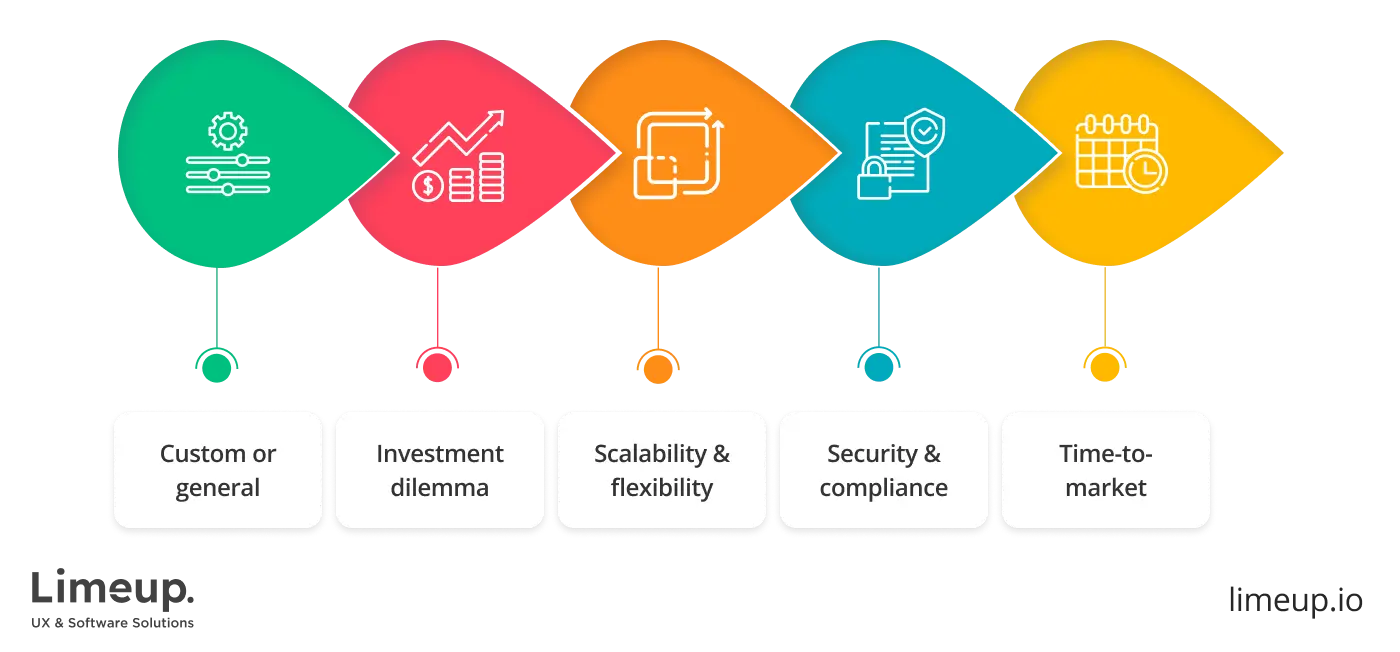
Tailored perfection vs one-size-fits-all. Programming a custom app is like inventing something from beginning to end, exclusively for someone. As a result of this, it is flexible to accomplish the specific hassles, processes and objectives that a company has.
On the contrary, conventional app creation often follows a more standardized, template-driven approach, similar to ordering a meal from a fast-food menu — quick, predictable, but lacking the personal touch. As much as it may accommodate most people, it is generally not elaborate and cannot perform personalized tasks, just like a custom app.
Personalized apps, such as the one Nike launched in 2017 to optimize their worldwide supply chain, are an example of how individualized approaches may greatly increase operational efficiency.
Investment dilemma. As for the cost perspectives, it is worth mentioning that, in many cases, the programming process of a custom app might be costlier — at least in the beginning. We have already gone over the peculiarities of the custom mobile applications development cost and the fact it depends on the features and interactivity of the app. As well as long-term returns that generate satisfactory rates of return tend to offset such upfront costs.
While traditional app development that typically involves the use of templates is supposed to be notably cheaper initially — it may incur hidden costs over time, particularly when it comes to scaling or customization.
Scalability and flexibility. We may state that change as a concept is the ability to successfully survive and operate in the new and rapidly evolving environment of the IT business. Engineering of custom applications is more flexible than the other types because business apps can be modified or upgraded as the firm expands. Traditional apps, although easier to launch, have a problem when companies want to grow or include new technologies.
As an illustration, Shopify started out as a small online retailer of snowboarding gear in 2004. It developed into one of the biggest e-commerce platforms in the world by constant innovation and platform modification, enabling millions of companies to launch their own unique online storefronts.
Security and compliance. Security is one of the most crucial aspects of the present and the future of the internet. Custom application programming enables organizations keen on putting in place tight, industry-standard security measures to do so tailored for the industry they operate in especially where it is compulsory such as in the financial and or healthcare sector.
IBM’s 2024 Cost of Data Breach Report found that the cost of a data breach to an organization was $4.88 million, which may only be the tip of the iceberg due to the poor security of manufacturing facilities within companies.
Conventional app creation may contain some extent of security features but these are very much general and do not suit the needs of many businesses.
A double-edged sword: time-to-market. In many cases conventional app creation is the winner in terms of time to market. Since these are built through pre-built components, launching such applications will be swift, which is perfect for a firm seeking to exploit a trend or niche. However, this speed often harms the stability of the firm and its ability to perform well in the long run.
Creation of a custom app, though, takes longer to develop than template-based programming, but all the details are worked out and the end product is not just robust and scalable but also future-proofed.
To develop a custom app: facing challenges
Creating a unique app is not an easy task, it entails an eclectic mix of difficulties that frequently resemble crossing a maze with turns and twists at every turn. Even though the outcome might be immensely satisfying, there are always challenges along the way that call for careful planning, a talented team and a lot of patience.
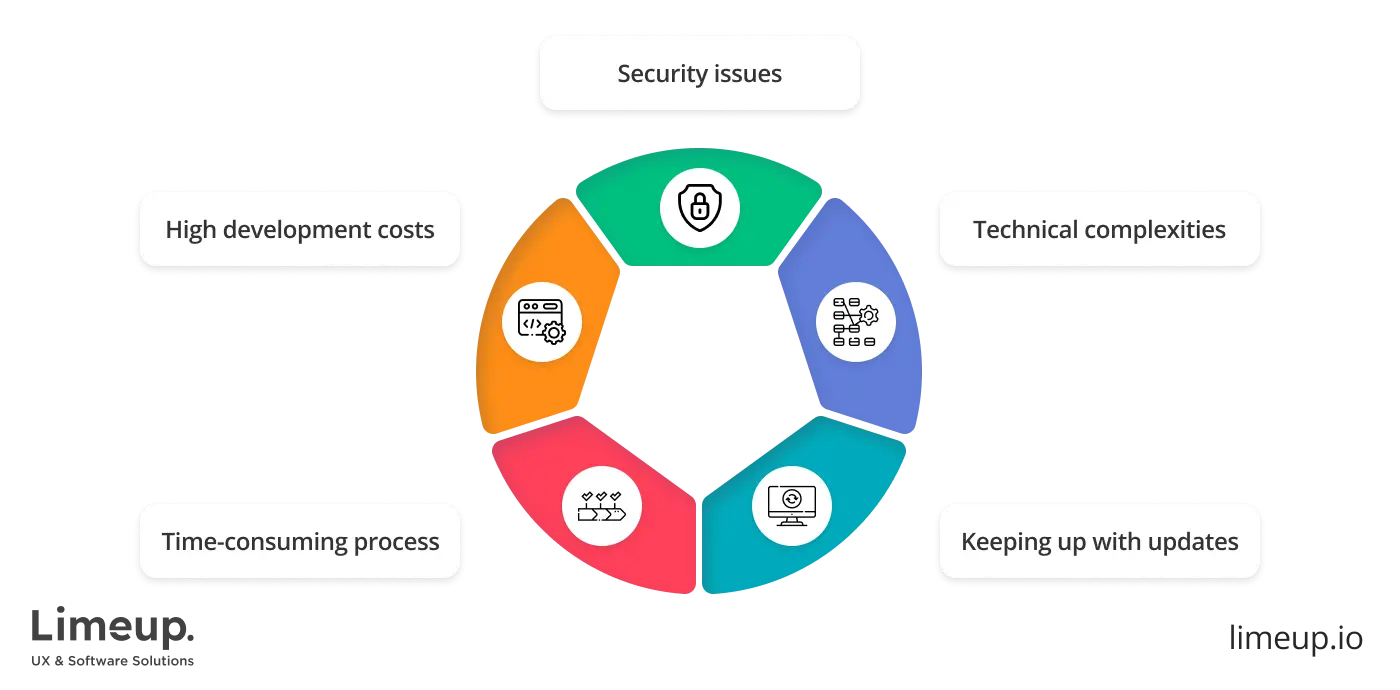
Customized app development is not something that happens overnight. It is quite a lengthy process that may take as much time as several months up to a year or more if the application is rather complicated. On the one hand, it makes a better and more detailed product possible. On the other, it means that it may take longer to start making some revenue or solve the problems that it intended to solve.
In this article, we already talked a lot about pricing as it is undoubtedly one of the most important aspects of custom app creation. This exorbitant expense might be a bitter pill to swallow for small and medium-sized businesses. It’s additionally necessary to have a clear plan and budget from the beginning because expenditures may rise if the project scope changes in the middle of development.
With all the sophistication that cyber threats possess today, checking whether custom-developed applications are completely secure from all kinds of potential data breaches or cyber-attacks is no small feat. But putting strong security mechanisms in place takes patience and diligence. Cybercrime is an ever-evolving field, so it could be very challenging for the developer to always stay ahead of looming threats.
Developing a custom app is often like walking through a minefield of technical challenges. It is challenging to include new technologies in your workstation, guarantee they can interconnect with many other devices and maintain optimal efficiency. Such as the fact that Uber faced numerous technical hurdles when developing a custom app that required both real-time GPS tracking and a well-integrated payment interface.
As custom application developers know, the real work begins after the app has been developed. To maintain the app and to have regular updates is tasking as that of the development of the app. Apps are required to be updated often to support newer operating systems, bug fixes and new feature releases. Failure to do so may result in an app getting stale or worse still, open to security threats.
Summarizing the development of custom mobile apps
The development of custom apps is emerging to be a significant strategic advantage for those who want to be unique in the market in today’s high-tech corporate world. Such a targeted approach to the audience is the best way to address needs and preferences and ensure that they get it right in terms of using apps to deliver excellent touchpoints, increased organizational performance and customer satisfaction.
Although it is not without its challenges: costs may be high, development might take a long time and there are technical issues but the advantages, nevertheless, overwhelm the drawbacks.
Hiring developers for creating an application for your company with specific requirements is a sound solution that is able to strengthen the company’s foundations for future development. The correct planning, along with a professional development team offers the opportunity for businesses to hit the jackpot within development and bring about a bespoke application that aligns perfectly with their unique requirements.
With the rapid advancement of technology, customized mobile app development will always be a strategic imperative as organizations will always want to compete in the digital markets.
Custom application production may be seen as a much superior form of programming since it minimizes missteps made when creating applications by decreasing the use of ready-made apps. This could end up in more productivity, happier customers and a stronger competitive edge.
Thus, building custom app is one of the most effective strategies that modern businesses have the ability to use to remain relevant on the market. Through this, firms may release the value for evolution, creativity and higher revenue in the digital economy.

